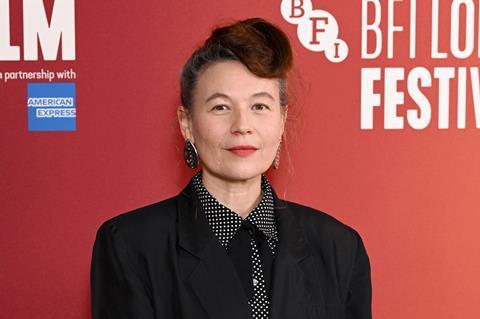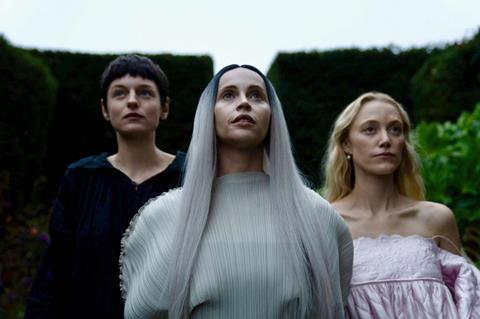
The 69th edition of the BFI London Film Festival (October 8-19) could have been the one where festival director Kristy Matheson tore up the template, rewrote the rules and put her stamp all over the festival with a radical restructure.
It is the third year in post for the former Edinburgh International Film Festival creative director and director of film at Australia’s national museum of screen culture (ACMI), and the first edition following the conclusion of her predecessor Tricia Tuttle’s five-year plan, which broadly continued Clare Stewart’s stencil of themed strands. But, with last year’s edition boasting 230,000 admissions, the highest in-person attendance for 10 years, Matheson is too canny to make change for the sake of it.
“I’ve spent the past two editions, and again this year, focusing on the programme itself — that’s a real luxury, to be able to do that,” Matheson says. “For me, the priority has been to deliver to audiences and UK industry. When I look at the results across the past two years, spending time to drill down and working with the talented programming team has been rewarding for me personally, and it’s served the festival.”
Tighter programme

Any tweaks have been to make the festival line-up more user-friendly for the public. “The strategy for us is trying to streamline the programme,” she says. “It’s a massive programme [with 166 features this year], and we spend a long time thinking about how it interfaces with the audience.”
This, Matheson says, was the thinking behind reducing the number of special presentations and increasing the galas (red carpet premieres at the Royal Festival Hall). The number of galas is 24 this year, versus 15 in 2024, while the number of special presentations has dropped to six compared to 15 last year.
Starry galas this year include Edward Berger’s Ballad Of A Small Player starring Colin Farrell and Tilda Swinton, Yorgos Lanthimos’s Bugonia headlined by Emma Stone, Lynne Ramsay’s Die, My Love with Jennifer Lawrence, and two films starring Paul Mescal: Oliver Hermanus’s The History Of Sound and Chloé Zhao’s Hamnet.
Matheson insists the decision to raise the number of galas was not based on luring sponsors for a high-profile spot. “We’re screening very anticipated films. There is some serious star-wattage in there, from the directors through to the film teams that come to those screenings. We made the naming conventions more streamlined so that it makes more sense for audiences.
“The special presentations are about us being able to illuminate the pillars of the programme for the audience,” she adds. For example, Jane Pollard and Iain Forsyth’s Broken English is the documentary special presentation and The Death Of Bunny Munro is the series special presentation.
But with the festival’s 70th anniversary approaching next year, Matheson is aware it cannot remain static. “We are already starting to talk about what that means, and what the next decade of the festival looks like,” she says.
Thinking ahead has been helped by a more sure-footed commitment from the UK government’s Department for Culture, Media and Sport, after a few years of ad-hoc funding. To support this 2025 edition, there is $2.6m (£1.9m) from the UK government’s $104m (£77m) Creative Industries Sector Vision, announced under the previous Conservative government in June 2023. From 2026-29, the government has committed to supporting the festival through its $101m (£75m) Screen Growth Package, although specific amounts will not be unveiled until later this year.
“It’s meaningful that the government has said it will continue to support the LFF over the next three years, to have that huge vote of confidence in the festival and what it brings to the cultural sector and the wider economy,” Matheson says. “It will enable the LFF to flourish.”
The festival covers 76% of its total production cost through self-generated income and sponsorship. However after a 16-year partnership, this will be the final edition with the support of headline sponsor American Express. Matheson and the BFI are keen to stress the festival is funded through an ecosystem of different revenue streams, so financial stability is never held in one place or reliant on a single partner.
Matheson will not reveal if negotiations are underway with any potential replacements, saying only: “We are regularly in conversation with potential sponsors at different levels.”
The LFF director describes her mission as packing the programme with “wow moments” for a full spectrum of audiences, from broad appeal to specialist titles. “It’s about us saying that we fundamentally celebrate the full breadth of screen and fan cultures,” she says, adding that it is of greater importance to her than securing world premieres, given LFF’s role as a public festival.
This year’s festival offers just seven world premieres, down from 15 in 2024. They include Giant, Rowan Athale’s biopic of boxer ‘Prince’ Naseem Hamed, and James Lucas’s Moss & Freud.
Matheson’s gems this year include: Andrew Schneider’s installation Now Is When We Are (The Stars) — “the most ambitious project” the festival has programmed in its Expanded strand; the world premiere of Yemi Bamiro’s Black Is Beautiful: The Kwame Brathwaite Story, a documentary about the life and work of the US activist and photojournalist; and Italian filmmaker Carolina Cavalli’s The Kidnapping Of Arabella, which premiered in Venice’s Horizons section last month.
Expressions of protest
There is nowhere for festivals to hide from protest and discussions on the war in Gaza, as recently seen in Venice, Toronto, and San Sebastian. Festivals have endeavoured to get out in front of the issue, with Toronto setting aside designated protest zones, and San Sebastian International Film Festival publishing an open letter rejecting the Israeli government under Benjamin Netanyahu and its “genocide” of the Palestinian people.
Matheson is not planning any official LFF moment of solidarity with the people of Gaza, but she is on board with the films and festival attendees expressing their positions. “It stands to reason that artists and audiences cannot, quite rightly, ignore the world around us. There are lots of films in the festival that are in dialogue, or reflect, the current world,” she says, pointing towards Khartoum, a documentary set in war-torn Sudan, and Kamal Aljafari’s With Hasan In Gaza.
Nor has Matheson attached the festival to the controversy surrounding Mubi’s $100m investment from venture capital firm Sequoia Capital, which also backs an Israeli defence technology firm. The festival has programmed several titles that the production-distribution company is involved with, including Jim Jarmusch’s Father Mother Sister Brother, Ramsay’s Die, My Love, Joachim Trier’s Sentimental Value and Kelly Reichardt’s The Mastermind.
“We are selecting those films because of their creative and cultural value,” Matheson says. “For us as a team to exclude things based purely on a rights-holder feels like it’s unfairly impacting on filmmakers and artists.
“But I do understand people have a very strong feeling about this, and those feelings are incredibly valid. I respect that everyone has the right to make their own choices about what they want to watch and what they want to support.”
LFF is no stranger to acts of political defiance. In 2023, UK film and TV crew held a demonstration outside the opening night gala to highlight the lack of support for crews during the Hollywood strikes, while last year’s closing night ceremony was disrupted by animal rights protestors ahead of a screening of Morgan Neville’s Pharrell Williams film Piece By Piece, owing to Williams’ links to French fashion house LVMH and its use of fur. The festival also pulled a screening of Undercover: Exposing The Far Right, a documentary about UK far-right activists, over safety concerns.
Matheson and her team have not had any specific training in risk management ahead of this year’s festival, but she says: “It’s something we talk about a lot as a team. It’s something we think about throughout the year when we’re planning the festivals and public events. It’s a very professionally-run production team — they are experts at their jobs.”

The festival opens with Netflix’s Wake Up Dead Man: A Knives Out Mystery and closes with Julia Jackman’s 100 Nights Of Hero, for which a UK-Ireland distributor will be announced soon. Opening and closing nights, in recent years, have been studio or streamer-backed films, so a modestly budgeted UK film is perhaps a surprising choice. (Independent Film Company will release 100 Nights Of Hero in the US on December 5.)
Its starry cast of Emma Corrin, Charli xcx, Nicholas Galitzine and Maika Monroe goes some way to explaining the selection. Matheson has a more visceral reason: “It was just an immediate instinct after screening the film that it would be an amazing way to end the festival. When we found out we could present the film for closing night, I had a little cry of joy.”
Without the heft of a studio or streamer, does it mean LFF will have to shoulder more of the costs for closing night celebrations than in previous years? “I wouldn’t make assumptions,” Matheson says with a wry smile. “Those are things that are very much costed into our budgets. You can’t have a festival without festive moments.”















![[L-R]: Amanda Villavieja, Laia Casanovas, Yasmina Praderas](https://d1nslcd7m2225b.cloudfront.net/Pictures/274x183/6/4/1/1471641_pxl_20251224_103354743_618426_crop.jpg)








![[L-R]: Amanda Villavieja, Laia Casanovas, Yasmina Praderas](https://d1nslcd7m2225b.cloudfront.net/Pictures/100x67/6/4/1/1471641_pxl_20251224_103354743_618426_crop.jpg)
No comments yet